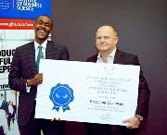 So we`ve been in China for almost two weeks now, but have not been able to blog because of a number of reasons. Firstly, the Chinese government does not allow access to any social network websites, except for Chinese based ones, which they ultimately, in one way or another, control too. If a substantial part of your everyday life depends on social network websites and blogs (as mine does), then it may be prudent to get hold of one of those IP masking software packages` that allow you to access any website from anywhere in the world, before making your way to Beijing, China. I wish someone had told me this before I left beautiful South Africa. Anyway, that’s all spilt milk now.
So we`ve been in China for almost two weeks now, but have not been able to blog because of a number of reasons. Firstly, the Chinese government does not allow access to any social network websites, except for Chinese based ones, which they ultimately, in one way or another, control too. If a substantial part of your everyday life depends on social network websites and blogs (as mine does), then it may be prudent to get hold of one of those IP masking software packages` that allow you to access any website from anywhere in the world, before making your way to Beijing, China. I wish someone had told me this before I left beautiful South Africa. Anyway, that’s all spilt milk now.Besides the glitch with the social websites, the trip has been quite interesting and surprising thus far. Overall, I am pleased with my decision to travel to Beijing. Here is a brief overview of what we have been exposed to so far.
The Chinese Political Economy
 It would be foolish to separate workings of the Chinese Economy from the ruling Chinese political party. The economy has been unashamedly described by some Chinese people as a “Planned Free Market”economy. There is only one ruling party in China, which (still) follows a largely Marxist and communist model. The government is heavily involved in the market economy, and it seems that the government controls all companies in major industries. For instance, there is only one mobile network (China Mobile)which is “owned” and the country’s major fuel and oil companies (Sinopec and Petro China) are state owned. The Chinese ruling party clearly has a tight grip on its economies` “commanding heights.”
It would be foolish to separate workings of the Chinese Economy from the ruling Chinese political party. The economy has been unashamedly described by some Chinese people as a “Planned Free Market”economy. There is only one ruling party in China, which (still) follows a largely Marxist and communist model. The government is heavily involved in the market economy, and it seems that the government controls all companies in major industries. For instance, there is only one mobile network (China Mobile)which is “owned” and the country’s major fuel and oil companies (Sinopec and Petro China) are state owned. The Chinese ruling party clearly has a tight grip on its economies` “commanding heights.”Notably, within this Political control, the Chinese economy has been growing at rapid speeds over the past couple of years, easily exceeding other developed western economies. The growth has been fuelled by an obsessive focus on manufacturing and Industrial work, which is evident in the city of Beijing. There city is large, complimented by skyscraping office and apartment buildings (some of which are incomplete and seem deserted), huge Shopping malls and pollution levels that would make any “green evangelist” quiver with fear and anger.
The political structure is unique to China. There is only “one” ruling political party, the Chinese Communist Party (CCP), which happens to be the largest political party in the world. Apparently, the CCP maintains its supreme power over China by controlling the entire State and Legislative process. There are a number of opposition parties within the political system, however their role is questionable as most were formed by the CCP.
So, as many foreign companies that have entered the Chinese economy have already learnt, it is a necessity to engage and “involve” the Chinese ruling party in all discussions that involve doing business in China. Hopefully our government and local businesses` understand this principle and are treading with informed levels of caution and excitement whilst working with the Chinese.
It is common knowledge that China has one of the largest populations in the world. The country has in excess of 1,3 billion people – that’s almost five times the United States population, over 27 times the South African Population and over 260 times the Irish Population.
 The country has a diverse but highly disproportionate Ethinic group structure, with Han Chinese (91.5%), Zhuang, Manchu, Hui, Miao, Uyghur, Tujia, Yi, Mongol, Tibetan, Buyi, Dong, Yao, Korean, and other nationalities (8.5%.) This situation, unfortunately, lends itself to vast forms of discrimination and favouritism amongst the majority groups. The language most spoken is Mandarin, which according to some locals, has been made easier in order to accommodate the minorities and foreigners in the country. Somehow I fail to grasp this concept, but then again the entire language structure, including its written form, is completely different to that which we are taught in the west. Thus far i`ve only been able to grasp two essential everyday words; Ni-Hao (Hello) and ShenShen (Thank you). I plan to add a couple of more words to my Chinese vocabulary before I return home.
The country has a diverse but highly disproportionate Ethinic group structure, with Han Chinese (91.5%), Zhuang, Manchu, Hui, Miao, Uyghur, Tujia, Yi, Mongol, Tibetan, Buyi, Dong, Yao, Korean, and other nationalities (8.5%.) This situation, unfortunately, lends itself to vast forms of discrimination and favouritism amongst the majority groups. The language most spoken is Mandarin, which according to some locals, has been made easier in order to accommodate the minorities and foreigners in the country. Somehow I fail to grasp this concept, but then again the entire language structure, including its written form, is completely different to that which we are taught in the west. Thus far i`ve only been able to grasp two essential everyday words; Ni-Hao (Hello) and ShenShen (Thank you). I plan to add a couple of more words to my Chinese vocabulary before I return home.Ironically though, China has the largest concentration of English speaking people across the world. But, it is extremely difficult to find an English speaking Chinese person in the city. This has led to us traveling the city with a list of addresses written in simplified mandarin so that we can let the taxi cab driver know our intended destination. At first, this was quite a nerve wrecking exercise because, not being able to read mandarin, we had no idea what was actually written on the lists.
Like most developing nations, there is a visible wealth gap among the people of China. (Using the city of Beijing as a reference.) The official statistics and reports claim that the gap between the wealthy and the poor has decreased substantially, but some of the UIBE university lecturers that we`ve spoken to disagree.(Gini co-efficient of 0,47). Life for many of the people in the rural areas has not changed much – they continue to live in stark poverty. The streets of Beijing city are filled with “rural” immigrants that have come to the city in search of jobs. It has become common to have “beggars” tugging away at our shirts’ pleading for money and food. However, there is also a healthy community of industrious rural Chinese people (traders) that fill the streets through the days and evenings, choosing to work for themselves instead of begging for small change in the streets. These people erect stalls on the pavements of the city each day (through to late hours of the evening) and sell anything from fruit, Chinese beads and “almost Nike and Adidas” sneakers and t-shirts.
I find it hard not to draw comparisons between South Africa and China while im here, even though I feel that the countries’ circumstances are somewhat different. I will do a blog post with some notable comparisons towards the end of the trip, and hopefully share some cool insights.




No comments:
Post a Comment